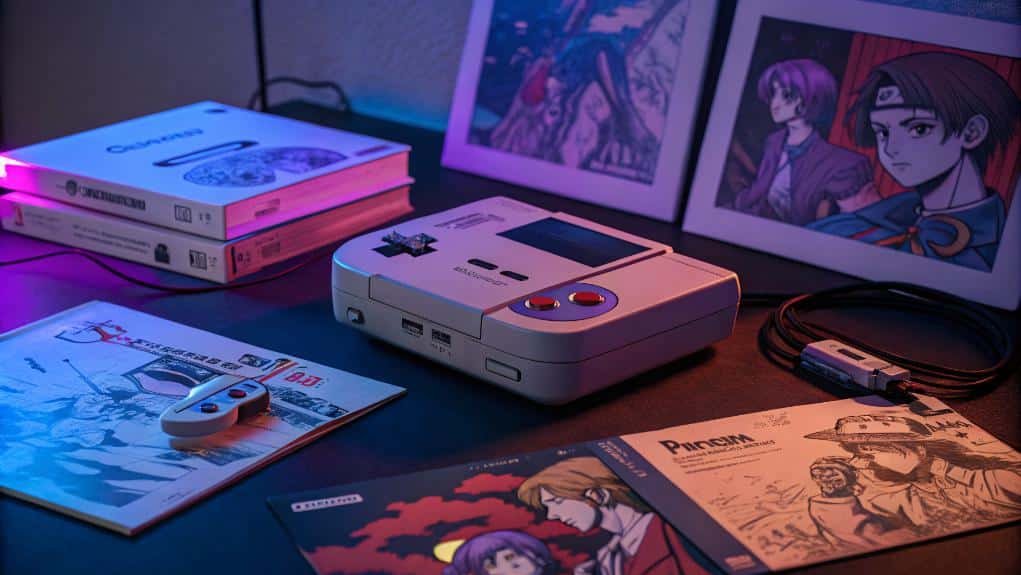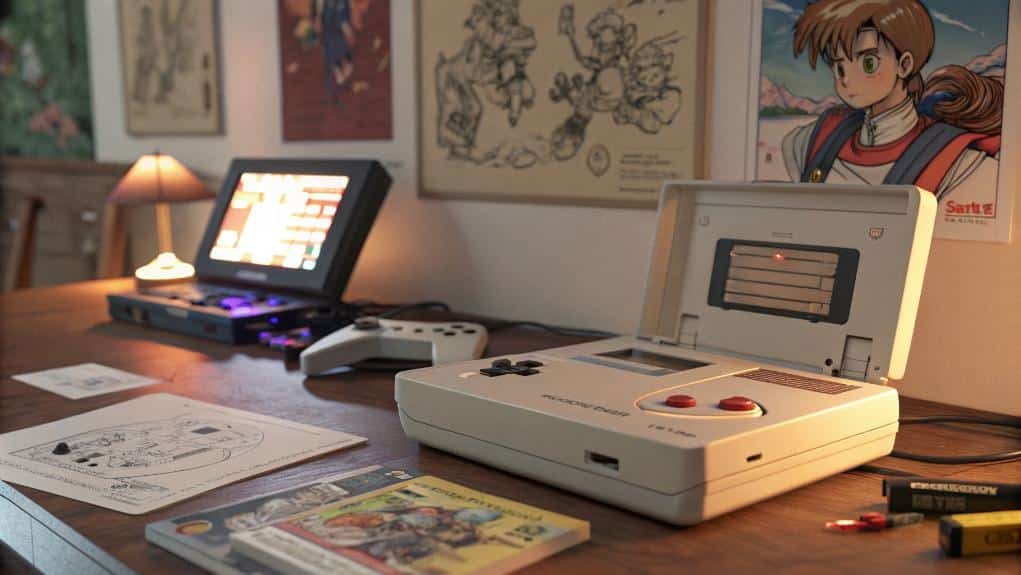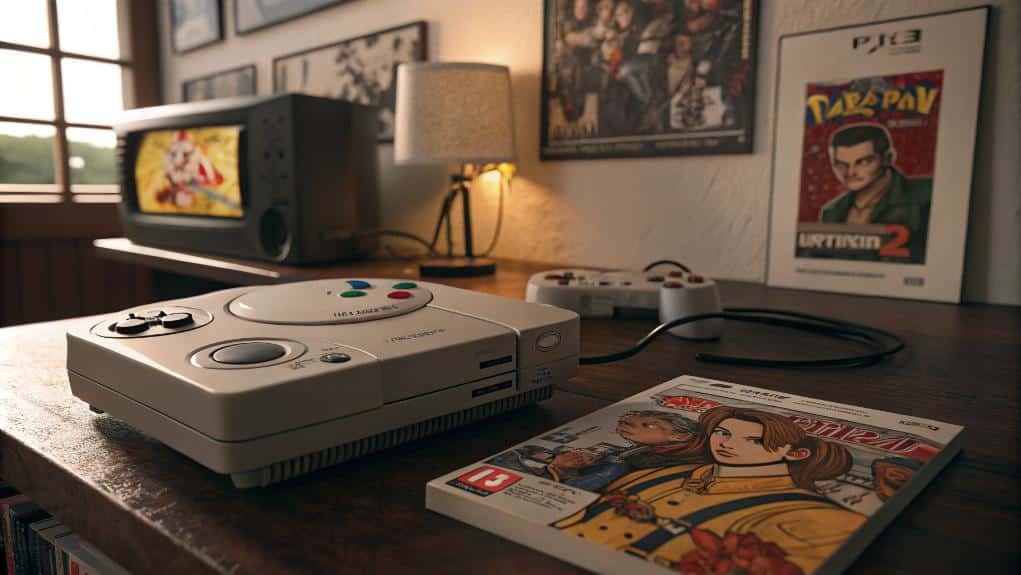"Persona 2: Innocent Sin" emerged in 1999 as a significant entry in the JRPG genre, blending engaging gameplay with profound psychological themes. It introduced innovative mechanics like a rumor system, shaping the narrative by allowing players to influence their environment. Its exploration of memory and identity resonated deeply, reflected in Tatsuya Suou's journey against the manipulative Joker. Despite facing censorship challenges, its PSP remaster in 2011 preserved the original's integrity. The game not only fostered a devoted fanbase but also redefined Atlus' localization approach, influencing future RPGs. There's much more to uncover about its legacy and thematic depth.
Key Takeaways
- Initial Launch: Persona 2: Innocent Sin debuted in Japan on PlayStation in 1999, facing significant localization challenges due to censorship issues.
- Censorship and Localization: Cultural references, particularly related to Nazism and homosexuality, influenced Atlus USA's cautious localization approach during the original release.
- PSP Remaster: The game was re-released on PSP in 2011, focusing on preserving original content while addressing previous censorship concerns.
- Innovative Gameplay: Introduced a dual-engine system for exploration and combat, enhancing player experience and gameplay dynamics compared to previous titles.
- Legacy: Despite initial challenges, Persona 2: Innocent Sin developed a cult following and influenced JRPG storytelling and gameplay mechanics in future titles.
Development and Release

In the domain of Japanese role-playing games, Persona 2: Innocent Sin stands out for its complex development journey and eventual release strategy.
Initially launched in Japan for the PlayStation in 1999, the game faced significant censorship challenges that hindered its international release. Concerns over cultural references and controversial content, particularly allusions to Nazism and homosexuality, led to a cautious approach from Atlus. This decision was compounded by the fact that Atlus USA faced limitations in resources and time during localization.
When the game was remastered for the PlayStation Portable in 2011, Atlus adopted new localization strategies. They aimed to minimize changes to preserve the original's integrity while still addressing censorship issues.
The PSP version saw the removal of Nazi iconography and some direct references to homosexuality, reflecting a balancing act between staying true to the source material and adhering to Western market sensitivities.
Despite these modifications, the remaster allowed fans outside Japan to finally experience the game, marking a pivotal moment in Atlus' approach to localization.
This shift had lasting implications, influencing future releases as the company sought to navigate the complex landscape of cultural sensitivity while maintaining their narrative vision.
Persona 2: Innocent Sin's release trajectory ultimately reshaped Atlus' philosophy regarding international gaming markets.
Plot Overview
With the groundwork laid in the previous section, Persona 2: Innocent Sin unfolds a rich narrative that intertwines themes of memory, identity, and the impact of rumors on reality.
The story begins with Tatsuya Suou and Lisa drawn into a band rehearsal orchestrated by Eikichi, leading to the revelation of their Personas and the introduction of a dangerous antagonist, the Joker. This antagonist, revealed to be their childhood friend Jun, manipulates memories and grants wishes, but at a dire cost, illustrating the game's exploration of character relationships and the consequences of their past actions.
As the plot progresses, the group navigates a web of intrigue involving the Masked Circle and various adversaries, including King Leo and Lady Scorpio. The rumor system allows NPC rumors to influence game events, further complicating their journey.
The narrative is punctuated by significant plot twists, such as Jun's tragic backstory and the traumatic event at Alaya Shrine, which deepen the characters' connections.
Ultimately, the climax involves a confrontation with their past and the revelation of manipulation by Nyarlathotep.
The resolution brings closure, embodying the themes of transformation and ascension while setting the stage for the sequel, Persona 2: Eternal Punishment.
Gameplay Innovations

Persona 2: Innocent Sin introduces several gameplay innovations that greatly enhance the player experience, setting a new standard for the series.
The shift to a third-person perspective marks a significant change, allowing for more dynamic exploration and combat mechanics. With freeform running replacing the previous block-by-block movement, players can traverse dungeons more fluidly. Additionally, the game features a dual-engine system that supports both exploration and combat, enriching the overall gameplay experience.
The simplified dungeon design reduces complexity, making navigation straightforward and less frustrating, while the seamless one-screen overworld fosters easier access to locations.
A standout feature is the rumor system, where players can spread rumors to create tangible effects in the game world, such as revealing new shops.
This mechanic adds an intriguing layer to character interactions, as conversations with NPCs and demons become essential for gathering information and items.
The combat mechanics also receive notable enhancements, with the ability to swap and fuse personae, as well as execute combination attacks through fusion spells.
Themes and Influences
Numerous psychological and narrative themes intertwine in *Innocent Sin*, creating a rich tapestry that elevates the game's storytelling. Central to its psychological exploration is Jungian psychology, with the concepts of the collective unconscious and shadow selves driving both character dynamics and plot development. Each character grapples with their repressed aspects, revealing emotional complexities tied to guilt, shame, and personal identity.
The intimate conflict of the first half contrasts sharply with the global stakes introduced later, particularly through antagonists like the Nazis. This narrative shift underscores the characters' personal struggles, showcasing how their inner demons reflect larger societal issues. Notably, the game's narrative unfolds in three acts, with escalating conflicts that challenge the characters' development.
Significantly, Jun Kurosu's growth in the final act highlights the game's focus on individual character arcs, reinforcing the significance of personal redemption.
Moreover, *Innocent Sin* employs symbolic enemies, such as the Joker, to represent the protagonists' internal conflicts. By integrating philosophical themes and mythological symbolism, the game invites players to ponder existential questions about humanity and selfhood.
This multifaceted approach not only deepens the narrative but also enriches the player's engagement with the characters' journeys.
Legacy and Impact

While many games in the JRPG genre have left their mark, *Innocent Sin* stands out for its innovative contributions and lasting influence within the Persona series and beyond. The game introduced a new engine and combat system, greatly shifting away from the established Megami Tensei formula. This evolution not only enhanced gameplay but also enriched character arcs, allowing players to engage deeply with the protagonists' journeys.
*Innocent Sin*'s complex narrative and retroactive storytelling escalated the conflict from the first Persona, creating a richer understanding for returning players. Its cultural implications, particularly surrounding sensitive themes, initially hindered its worldwide release, yet this controversy only fueled a cult following that continues to thrive. Additionally, the game is notable for its extensive side quests and character interactions that further deepen the player's experience.
The game's eventual re-release on the PSP in 2011 made it accessible to a broader audience, showcasing its enduring relevance.
The game's legacy extends beyond its own series, influencing the development of subsequent JRPGs. By modernizing visual design and gameplay mechanics, *Innocent Sin* has left an indelible mark, prompting discussions within the gaming community about its innovative approach to storytelling and character development.

